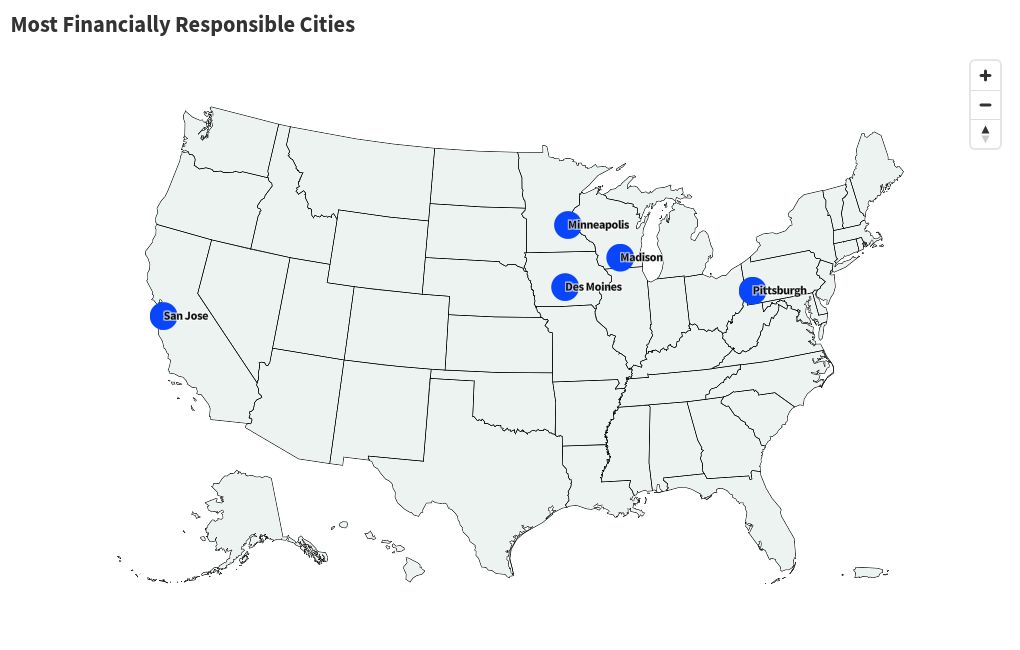Where you live can play a significant role in your finances. With cost of living, inflation, housing and food costs all somewhat dependent on the area you live in, Americans’ personal financial habits can vary drastically by location.
A new report from LendingTree ranked the most and least financially responsible metros based on debt-to-income (DTI) ratios, credit inquiries, maxed-out credit cards, spending on housing costs and low credit utilization rates.
Tied for the top spot were Des Moines, Iowa, and San Jose, California, with low housing costs and debt-to-income ratios.
Why It Matters
U.S. households collectively owe $18.203 trillion in debt in 2025, according to the Motley Fool. While mortgages make up 70 percent of this, your personal finances and debt can play a major role in overall quality of life.
With poor finances, car and home loans will likely be rejected and life decisions like starting a family or getting married could be delayed significantly.
The map shows the most financially responsible cities based on a new LendingTree report.
What To Know
Des Moines was one of the most financially responsible cities, with only 18.9 percent of households spending 35 percent or more of their income on housing, the fourth lowest across 100 of the largest metros.
San Jose had the lowest debt-to-income ratio at 51 percent, tying with Syracuse, New York, and Harrisburg, Pennsylvania. And 76.6 percent of cardholders kept their utilization below 30 percent.
Also in the top five were Madison, Wisconsin; Minneapolis, Minnesota; and Pittsburgh, Pennsylvania.
Madison had a top spot as it boasted the lowest percentage of cardholders having at least one maxed-out card, at just 16.3 percent.

The Visa, Mastercard and American Express logos on various credit and debit cards beside a U.S. $1 bill.
The Visa, Mastercard and American Express logos on various credit and debit cards beside a U.S. $1 bill.
Anna Barclay/Getty Images
Least Financially Responsible Metros
Some cities on the list stood out as residents were some of the least financially responsible across the country.
Claiming the worst spot was McAllen, Texas, which had the highest average number of credit inquiries over the past two years (6.7), the largest share of cardholders with at least one maxed-out card (35.8 percent) and the lowest rate of cardholders with a utilization below 30 percent (43.0 percent).
“That struggle is almost certainly made worse by the fact that McAllen residents tend to have lower incomes and lower credit scores than people in other big cities around the country,” Matt Schulz, LendingTree chief consumer finance analyst, said in the report.
“Lower credit scores make it harder to get credit, and lower income means that if you do qualify for a credit card, your credit limit probably won’t be very high. That makes for a challenging situation for McAllen residents, leaving them precious little wiggle room financially.”
Kevin Thompson, the CEO of 9i Capital Group and the host of the 9innings podcast as well as a Texas native, echoed the sentiment.
“A lot of what you see—the big houses, the glitz, the glamour—is often a mirage, masking high levels of debt and financial instability beneath the surface,” Thompson told Newsweek. “McAllen continues to struggle with high poverty rates, and many residents face ongoing challenges with housing affordability.”
Riverside, California, and Miami, Florida, also landed in the bottom three. While Riverside had by far the worst debt-to-income ratio at 251 percent, Miami saw housing costs dampen finances. Roughly 37.6 percent of households spent 35 percent or more of their income on housing.
Also in the bottom five were Virginia Beach, Virginia, and Las Vegas, Nevada.
What People Are Saying
Matt Schulz, LendingTree chief consumer finance analyst, in the report: “Obviously, there’s discipline required to live within your means no matter how much you make or where you live, but it shouldn’t surprise anyone that making more money or living in a lower-cost area would make that easier.”
Kevin Thompson, the CEO of 9i Capital Group and the host of the 9innings podcast, told Newsweek: “Some areas are simply disadvantaged from the start. McAllen may have a lower cost of living, but the economic opportunity hasn’t kept pace with the region’s basic needs. Long term, these struggles are likely to persist, and the economic divide will continue to widen—forcing many to leave in search of higher incomes elsewhere. As a result, we’ll likely see continued population growth in cities where jobs are more plentiful, even if affordability remains a challenge.”
Alex Beene, a financial literacy instructor for the University of Tennessee at Martin, told Newsweek: “The common theme with these findings isn’t where these cities are located, but rather the financial principles their residents are using to be responsible with their money. Whether you’re in a high income city like San Jose or a more mid-range one like Des Moines doesn’t matter. It’s about being better at saving, keeping your credit utilization low, and avoiding crippling amounts of debt.”
What Happens Next
Because the cities that ranked at the top and the bottom were scattered across the country, experts say your personal finance habits are just as, if not more, important than the exact city or region you live in.
“The metros that rank are incredibly diverse, both in personal and in business income, but that’s a testament to the lesson many Americans need to learn,” Beene said. “In the end, your financial outlook is less about income and more about the outcomes.”

